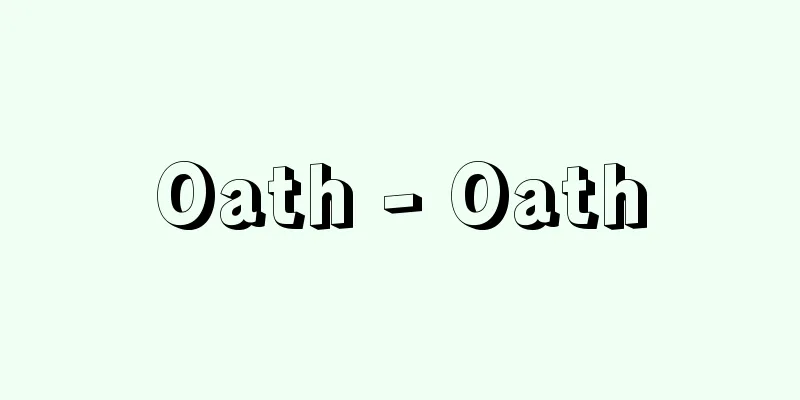Police station - Police

|
[Noun] ('Kei' means to stop people on the road) To call out to warn others and get them to move ahead. When the Emperor enters or leaves, when a noble passes by, or during a religious ceremony, people would look down and say things like 'Oo', 'Shishi', 'Oshi', 'Oshioshi', etc. Also, the voice that is produced. Keihichi. Misakioi. ※The Imperial Court Ceremony (833) - The Emperor and His Ministers' Morning Celebration Ceremony: “ The guards and the attendants are always there to guard the ground.” ※Konpira Honpōgen (around 1220), Volume 2: “When my lord traveled, <omitted> he accompanied the advance guard and his chariot , and the ceremony was difficult to carry out.” [Han Shu - King Chang of Huainan Li] [Glossary] (1) We can see from the Records of the Grand Historian - Biographies of Mount Hengshan in Huainan and the example of King Chang of Huainan Li, the youngest son of Emperor Gaozu of the Former Han Dynasty. (2) In Japan, too, it was held mainly when the Emperor entered or left the palace, and on more casual occasions when accompanying guests (The Pillow Book, vol. 23). Gradually, however, nobles and ministers also began to hold it secretly when they went on private trips (Edansho, vol. 1). (3) The order and manner of speaking were precisely regulated. The speech made when receiving a summons from the Emperor was called " Isho. " Kei-Hichi [police crossing]Source: The Selected Edition of the Japanese Language Dictionary About the Selected Edition of the Japanese Language Dictionary Information |
|
〘名〙 (「蹕」は道行く人の足を止める意) 声をかけてまわりをいましめ、先払いをすること。天皇の出入の時、貴人の通行の時、あるいは神事の時など、下を向いて、「おお」「しし」「おし」「おしおし」などと言ったもの。また、その声。けいひち。みさきおい。※内裏式(833)元正受群臣朝賀式「警蹕侍衛如レ常」※金刀比羅本保元(1220頃か)下「吾君御幸の時は、〈略〉前駆御随身御車に副、警蹕(ケイヒツ)にして儀式たやすからざりしに」 〔漢書‐淮南厲王長〕[語誌](1)古くは帝王に対してのみ用いられたことは、「史記‐淮南衡山列伝」や、前漢高祖の末子淮南厲王長の例によっても知ることができる。 (2)日本でももっぱら天皇の出御・入御に際して行なわれ、やや降って陪膳の折にも行なわれた(「枕草子‐二三」)が、次第に高貴な卿相公達もまた、私行の時に密かに行なうようになった(「江談抄‐一」)。 (3)発声者の順位や作法は細かく定められていた。なお、天皇の召しを受けた時などの発声は、「称唯(いしょう)」と言う。 けい‐ひち【警蹕】出典 精選版 日本国語大辞典精選版 日本国語大辞典について 情報 |
>>: Cinnamic acid (Cinnamic acid)
Recommend
Pediculus
...The Neolinognathidae family is a special kind ...
Norbixin
… (1) Annatto is the common name for the red pigm...
Liparis krameri (English spelling) Liparis krameri
… [Ken Inoue]. … *Some of the terminology that me...
Footprints - footprints
A full-length novel by Tokuda Shusei. First publis...
Nuclear umbrella - nuclear umbrella (English spelling)
A state in which the deterrent function that works...
Paper making machine
A machine for making paper. It consists of three ...
participatory democracy
...In other words, the core democratic rights of ...
Waffle (English spelling)
① A type of Western confectionery. A dough made of...
Lower Egypt
A geographical and cultural division of the Nile b...
Consumer movement - shohishaundou (English spelling)
A movement in which consumers band together to cr...
dienophile
...In both industrial and laboratory use, it is u...
Kolpino (English spelling)
A city in the Leningrad Oblast in northwestern Rus...
Ascaphus
…In some species of the same species, this is a h...
Picnic - picnic (English spelling)
There are various meanings for picnics, such as f...
Shu'ubiyya Movement (English spelling) al-Shu'ūbīya
It was an intellectual movement that started in t...


![Uwa [town] - Wow](/upload/images/67cb02440d6e3.webp)






